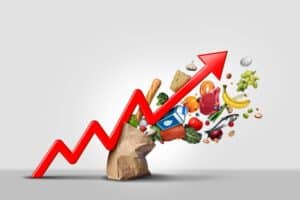The rising prices of the average household food basket, electricity against a national minimum wage that does not match the cost of living

The rising prices of the average household food basket, electricity and transport against a national minimum wage that does not match the cost of living will force the general worker in South Africa to underspend on food by at least 46.8%.
This is according to the Pietermaritzburg Economic Justice and Dignity (PMBEJD) Household Affordability Index for August 2022.
The PMBEJD calculated that a general worker, paid a minimum wage of R4 081.44 for 22 days of work (R23.19 per hour), will only have about R1 700 left after paying for transport and electricity (which collectively cost R2 371.50). As ‘a minimum nutritional basket of food for a family of four’ costs R3 212.97, PMBEJD estimates that workers’ families will underspend on food by at least 46.8%.
ALSO READ: Ever increasing food prices may be the work of opportunistic retailers
“Progress in addressing the job crisis is too slow and wages for those who do have a job, and for people who are able to access some form of social grant, are still far too low, and are being decimated by higher costs of transport, electricity, and food,” notes the report.
Food prices
It says the estimated cost to feed a child a basic nutritious diet is R820.26 in August, a R72.96 year-on-year increase.
“In August 2022, the Child Support Grant of R480 is 23% below the food poverty line of R624, and 41% below the average cost to feed a child a basic nutritious diet.”
The index, which tracked food prices from 44 supermarkets and 30 butcheries in Johannesburg, Durban, Cape Town, Pietermaritzburg, and Springbok, determined that the average household food basket is R4 775.59, a 0.6% month-on-month increase in August.
However, the basket is 12.6% more expensive than last year, having increased by R534.47.
Speaking to Moneyweb, Ashburton Investments economist and portfolio manager Wayne McCurrie says the reality is that one is forced to go down the value chain when buying food by shopping at Shoprite or Boxer instead of Pick n Pay [for example].
“Most of the time, people will not resort to eating less. They will instead resort to eating cheaper food. Perhaps they will eat less meat and opt to buy house brand’s instead of expensive brand foods in other categories.
“The only real encouragement is that we are over the worst of it,” McCurrie adds.
According to money coach and facilitator at 1Life Insurance, Hayley Parry, a major concern is that there is a point where one cannot cut the food spend any further. “What is the most concerning with this backdrop is that people tend to turn to credit, which in turn will only make things worse for the consumer on a personal finance level.”
The index further reported that food baskets increased in Johannesburg by 2.5%, Springbok by 0.3% and Pietermaritzburg by 2.3%, and decreased in Durban and Cape Town by 0.9% and 0.5%, respectively.
It says August saw 21 out of 44 foods increase in price, which is notably lower than previous months:
- Maize meal prices continued to climb in all areas.
- Flour prices also increased in all areas except in Durban.
- The price of cooking oil increased in Johannesburg by a further R7.08 taking a 5L bottle to R246.91.
- Prices of white and brown bread increased significantly in Johannesburg by 4% and 8 respectively, and in Pietermaritzburg by 9% and 11%, respectively.
Another significant increase was noted in the household domestic and personal hygiene index which saw a R23.85 month-on-month increase, bringing the total average cost to R900.45 in August.
Municipalities increased the price of prepaid electricity on average by 7.47%. “In Pietermaritzburg, 350kWh of prepaid electricity increased by R56, from R731.5 to R787.5.”
Taxi fares increased across the country between R2 and R3, and in some cases by R5 per local trip.
“It needs to be cautioned that whilst the monthly price increase does appear to be lowering, the [cost of the] household basket is still increasing, albeit at a slower pace. We are not yet seeing any significant climb down in prices which would bring down the total cost of the household food basket in a substantial way and alleviate pressures on households,” reads the report.
“The high cost of food remains a major crisis for millions of South African families and continues to frustrate peoples’ need to live a full productive life, to be able to afford proper nutritious food, and be healthy and well and in control of their future.”
Parry says it is important for South Africans to manage their money well by avoiding credit and if possible, by establishing an emergency fund.
“We don’t know what is going to happen in terms of the rising cost of living and the factors underpinning these issues. We’re usually not forced to develop the skill of managing our money when we’re financially secure. But this is an opportunity to get a financial education and to learn to focus on what we can control,” she adds.
ALSO READ: Health Squared Medical Scheme tells members to find another medical aid






